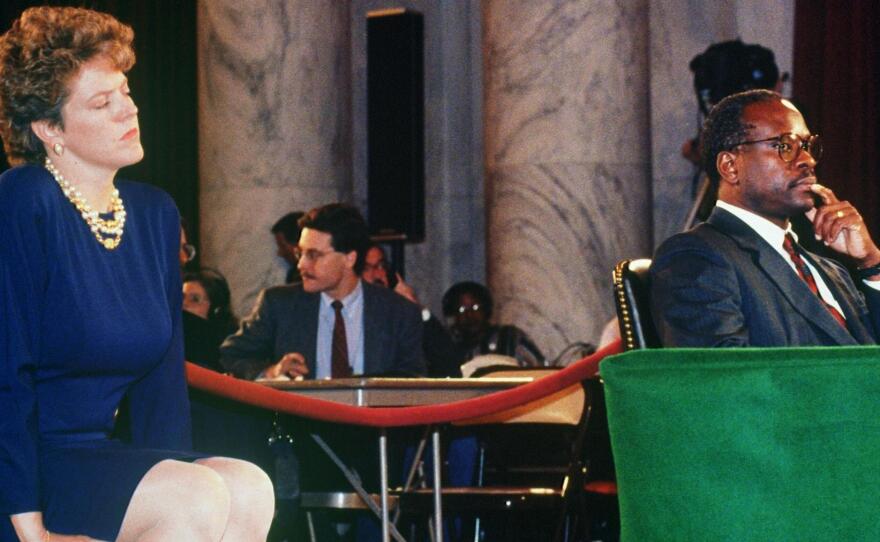Updated September 30, 2022 at 10:54 AM ET
Ginni Thomas, a longstanding conservative activist and wife of Supreme Court Justice Clarence Thomas, appeared before the House Jan. 6 panel for closed-door testimony on Thursday about her communications with those pushing an effort to overturn the 2020 election results. Here's a closer look at Ginni Thomas and her activism.
Virginia "Ginni" Thomas is a daughter of the Heartland, an Omaha, Neb., native born into a Republican family.
Known then as Virginia Lamp, she attended school and studied law at Creighton University in her hometown.
At one point, she aspired to become a member of Congress and made the conservative movement her mission.
"A lot of people know me because of my husband who's on the Supreme Court, but the truth is I'm my mother's daughter," Thomas said in a political endorsement video for Texas GOP Sen. Ted Cruz's 2016 presidential run, explaining that her mother was once a delegate to the Republican National Convention.
Several years earlier, Thomas had helped lead the charge in the rising tea party movement, one in which Cruz also figured prominently.
"And I caught the bug when I was a teenager," she said in the Cruz video.
She has a long track record in conservative activism
Thomas, the wife of Supreme Court Justice Clarence Thomas, has a long track record in conservative activism. Over the years, that activism has veered more into the controversial.
It took an especially dramatic turn in the weeks following former President Trump's re-election loss when Thomas was in touch with Trump's then-top White House aide to actively pursue overturning the results.
"It's extraordinary. This is a pipeline between the spouse of a Supreme Court justice, the judicial branch, and the chief of staff at the White House," CBS News correspondent Robert Costa, one of the reporters who first broke the joint Washington Post-CBS story on the text messages, told NPR.
In the weeks following Trump's November 2020 loss, Thomas sent 29 messages to his Chief of Staff Mark Meadows pushing false claims and conspiracy theories. She urged him and others to fight President-elect Biden's win.
NPR has independently confirmed the text messages and their contents with sources familiar with the House select committee's discussions but not authorized to speak on the record.
A source familiar with the panel's talks also said that Ginni Thomas is not a target of the committee's probe and the panel has not decided whether or not it will ask her to appear to testify.
Thomas faces a new controversy with the revelations, but even as the spouse of a Supreme Court justice, she retains an ability to exercise free speech, experts say.
"On the one hand, there's Ginni Thomas the political activist, who has, you know, certainly what I would describe as extreme views, but views that, of course, she has a constitutional right to have," said University of Texas law professor Stephen Vladeck, who specializes in issues facing the Supreme Court.
After Thomas received her law degree, she focused on labor issues.
In the 1980s she met her future husband, who was then the chairman of the Equal Employment Opportunity Commission.
They married in 1987, and he was nominated to the Supreme Court in 1991.
She jumped into her husband's work
Thomas did not shy away from jumping into her husband's work. For example, she reached out to lawyer Anita Hill to demand an apology after Hill accused her husband of sexual harassment.
"So give it some thought and certainly pray on this, and hope that one day you will help us understand why you did what you did. OK, have a good day," Ginni Thomas said in the message.

It was one of a long line of public moments for Ginni Thomas.
She has made her link to her husband known, once interviewing him for the Daily Caller.
"Clarence Thomas, you're the best man walking the face of the earth," she told her husband in the 2018 interview.
Thomas responded "I'm really stressed out about this interview."
The two made clear they have bonded over politics, religion and more.
Recently, Ginni Thomas said told the Washington Free Beacon that like many married couples, they share many of the same ideas. However, she said they stay out of each other's work.
"Clarence doesn't discuss his work with me, and I don't involve him in my work," she told the media outlet.
Thomas admitted she did attend the Jan. 6 rally at the Ellipse that preceded the attack on the Capitol, but left early because it got cold and did not go the Capitol. She also noted she didn't help organize the attack.
But those ties are in larger focus today. In January, the Supreme Court allowed a Democratic-led House select committee investigating the Jan. 6 attack to access Trump White House records. Trump had sued to block the move, and Justice Thomas was the lone dissenter.
It's still not clear if Ginni Thomas' text messages were among those records or whether Justice Thomas knew of them.
University of Texas law professor Stephen Vladeck says the reports highlight how well the court polices itself when it comes to ethical concerns.
"It does bring further light to something that some of us have known for a while, which is that there really aren't sufficient number of ethical rules that apply to the Supreme Court and there's no enforcement mechanism for those rules that do," Vladeck said.
And while Vladeck says it's unclear if Justice Thomas has violated any ethical rules, this new development leaves Congress facing, yet again, a dilemma on how to deal with such concerns in the future.
"If nothing else, this reinforces the need for Congress to have a serious conversation about imposing the same ethical rules on the Supreme Court that apply to lower court judges," Vladeck said. "And about what to do in circumstances were it seems pretty clear that a justice has violated those rules."
Copyright 2022 NPR. To see more, visit https://www.npr.org. 9(MDAzMjM2NDYzMDEyMzc1Njk5NjAxNzY3OQ001))








